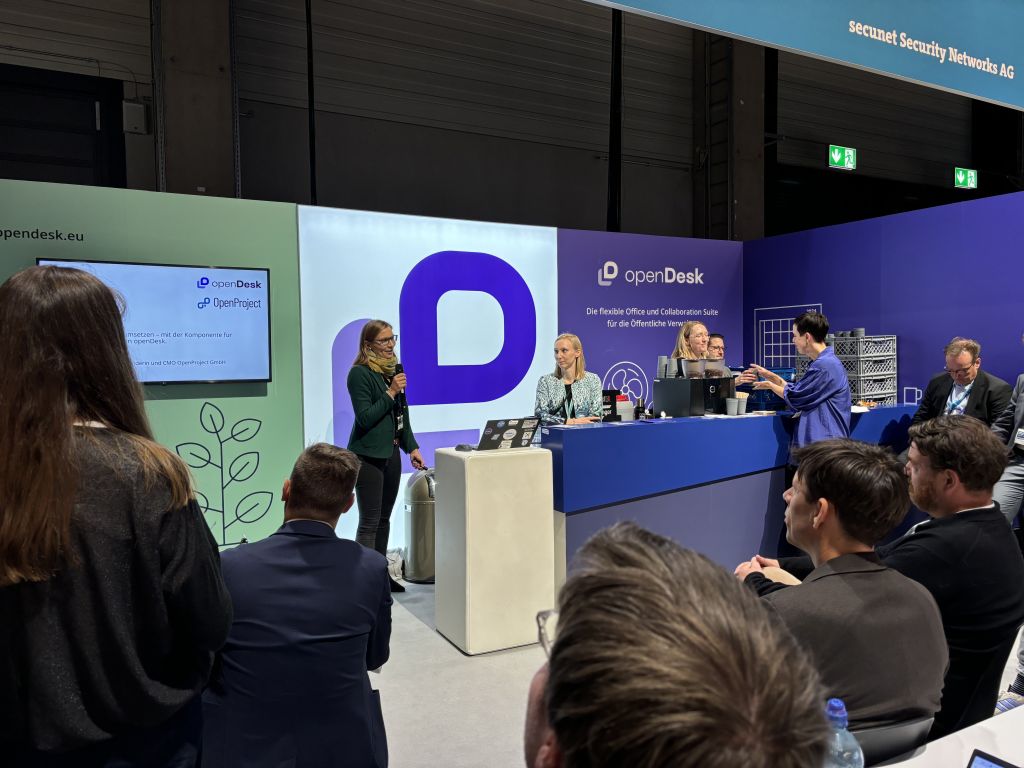openDesk 1.5 introduces new features for projects and notes
Version 1.5 enables you to organise projects more efficiently, create more professional notes, and bolster your institution's digital sovereignty with new collaboration features.
News
The digital transformation of government services took a significant leap forward at this year's Smart Country Convention. ZenDiS unveiled openDesk 1.0, a comprehensive open-source collaboration suite developed specifically for public administration. Beyond just software, it represents a fundamental shift towards technological independence and a new approach to digital governance in Europe.
A week after the Smart Country Convention in Berlin, we’re still reflecting on an incredible event. Held from 15–17 October, SCCON 2024 marked a major milestone for us: the successful launch of openDesk 1.0.
The third day of the exhibition was particularly thrilling when we officially presented openDesk 1.0 on the Atrium Stage. The impressive turnout and keen interest in our presentation demonstrated the growing demand for sovereign digital solutions in the public sector.
Our colleagues Alexander Smolianitski and Dr Lea Beiermann showcased the full range of features in our Office & Collaboration Suite, and explained how openDesk is helping to strengthen public sector digital sovereignty in Germany. This success has been possible thanks to our international partner network, which was represented at SCONN by Anna-Livia Gomart from the Direction interministérielle du numérique (DINUM).
The presentation highlighted the core concept of openDesk: a powerful all-in-one solution created by integrating ten open-source components. This combination of proven open-source technologies enables public authorities to reclaim their digital autonomy while utilising modern collaboration tools.

Panel conversations with representatives from authorities already using openDesk proved particularly valuable. Reiko Wendt from BWI GmbH and Dr Michael Goltz from the Robert Koch Institute shared their experiences, noting that openDesk isn't just being used by these institutions but is continuously being improved on thanks to ongoing feedback from public sector employees.
The response at our community stand exceeded our expectations. The interest in openDesk was enormous, as reflected by the attendance at our official launch event.
Prior to the launch, over thirty public institutions had already received access to our testing environment, including the German Federal Ministry of Health, Federal IT-Cooperative (FITKO), State of Berlin, and Federal Administration of Switzerland. Our key insight: each authority uses the solution in its own unique way: for encrypted real-time communication, as a forum for knowledge exchange, for collaboration in international teams, or for managing complex projects.

The success of openDesk wouldn't have been possible without our strong partners. At the community stand, we presented the capabilities of our integrated solution together with B1 Systems, STACKIT, Collabora, Element, Nextcloud, Nordeck IT + Consulting GmbH, OpenProject, Open-Xchange, Univention and XWiki. Each partner contributes important software components and services. Together they create a powerful all-in-one solution.
The highlight of the presentation came when all contributors joined us on stage—an impressive display of our collaborative strength. As we jokingly remarked: it's a good thing the stage was just a carpet, or it might have buckled under the number of participants!
With the launch of openDesk 1.0, we've reached an important milestone: a collaborative office suite by the public sector, for the public sector. An open-source solution that doesn't just promise digital sovereignty but delivers it. The IT Planning Council's decision to establish ZenDiS as a centre of expertise and service is now bearing visible fruit.
We're already looking forward to SCCON 2025! Until then, openDesk will continue to support many more public authorities on their journey toward digital sovereignty.
Version 1.5 enables you to organise projects more efficiently, create more professional notes, and bolster your institution's digital sovereignty with new collaboration features.
NewsWe are working constantly to strengthen openDesk on discovered vulnerabilities. The update to version 1.11.4 fixes issues on OpenProject.
News